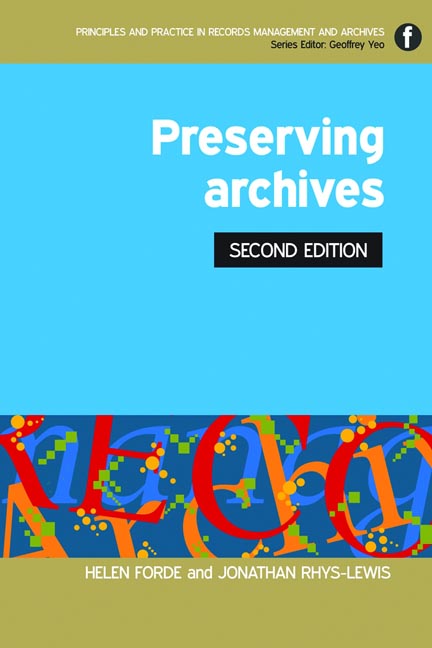Book contents
- Frontmatter
- Contents
- Introduction to the series Geoffrey Yeo
- Preface to the Second Edition
- Acknowledgements
- 1 Introducing archive preservation
- 2 Understanding archival materials and their characteristics
- 3 Managing digital preservation
- 4 Archive buildings and their characteristics
- 5 Safeguarding the building and its contents
- 6 Managing archival storage
- 7 Managing risks and avoiding disaster
- 8 Creating and using surrogates
- 9 Moving the records
- 10 Exhibiting archives
- 11 Handling the records
- 12 Managing a pest control programme
- 13 Training and the use of volunteers
- 14 Putting preservation into practice
- Appendices
- Bibliography
- British and international standards relating to archive preservation
- Index
13 - Training and the use of volunteers
Published online by Cambridge University Press: 09 June 2018
- Frontmatter
- Contents
- Introduction to the series Geoffrey Yeo
- Preface to the Second Edition
- Acknowledgements
- 1 Introducing archive preservation
- 2 Understanding archival materials and their characteristics
- 3 Managing digital preservation
- 4 Archive buildings and their characteristics
- 5 Safeguarding the building and its contents
- 6 Managing archival storage
- 7 Managing risks and avoiding disaster
- 8 Creating and using surrogates
- 9 Moving the records
- 10 Exhibiting archives
- 11 Handling the records
- 12 Managing a pest control programme
- 13 Training and the use of volunteers
- 14 Putting preservation into practice
- Appendices
- Bibliography
- British and international standards relating to archive preservation
- Index
Summary
Introduction
One of the key impacts on the success of collection care programmes is the availability of resources – these will vary considerably from institution to institution. Financial resources are becoming increasingly tight for heritage institutions and this presents many additional pressures and challenges. The preservation manager must continue to explore alternative means of addressing the significant needs of the collections. One particular resource that is vital to all elements of preservation is the people to carry out the activities, especially those who can physically process and/or package collections.
Two options are available:
• to extend the activities, capabilities and skills of all members of staff
• to develop programmes and systems to enable the use of volunteers.
In this chapter these two choices are addressed to ensure that they both may become integral elements of preservation planning.
What options for preservation training are available?
The manager has a number of different options for developing staff preservation skills and awareness. Most organizations will identify training needs via a staff appraisal process, but it will also require some knowledge of what is available, especially if specialist needs are identified. Alongside this commitment will be existing responsibilities for specific preservation activities among staff (not necessarily specialist) which might include pest management or environmental monitoring. These activities would ideally be included in individual job descriptions, which in turn presents a stronger imperative to provide training, and consequently to carry out the activity. This training may be provided in the following ways:
• Staff attend subject-specific external seminars and training events.
• Staff attend professional conferences (in the UK and abroad).
• Staff attend training at another organization, one-to-one with another professional.
• Staff who have attended a subject-specific or one-to-one training event provide cascade training for other staff within the organization.
• External trainers are commissioned to provide subject-specific training events.
• Staff attend subject-specific training provided by other specialist members of staff within the organization; this may be as part of a wider induction programme or as part of the preparation for a specific project.
- Type
- Chapter
- Information
- Preserving Archives , pp. 203 - 210Publisher: FacetPrint publication year: 2013



